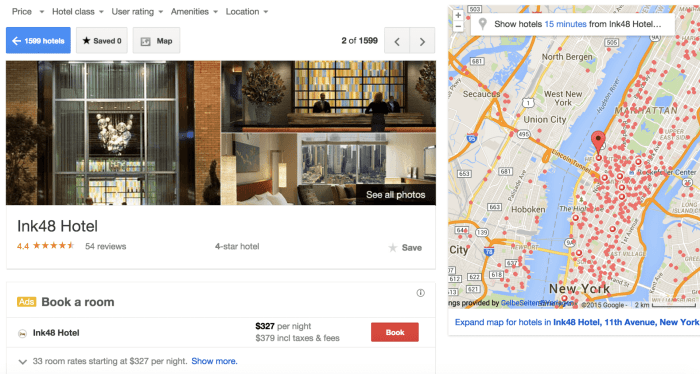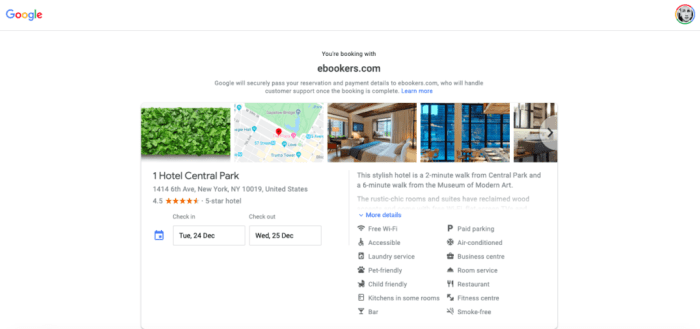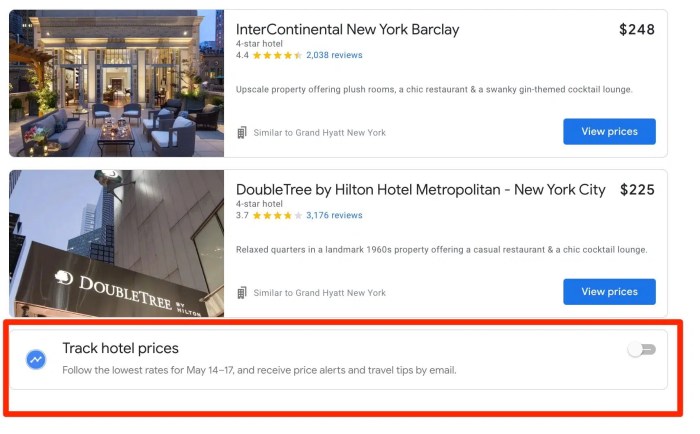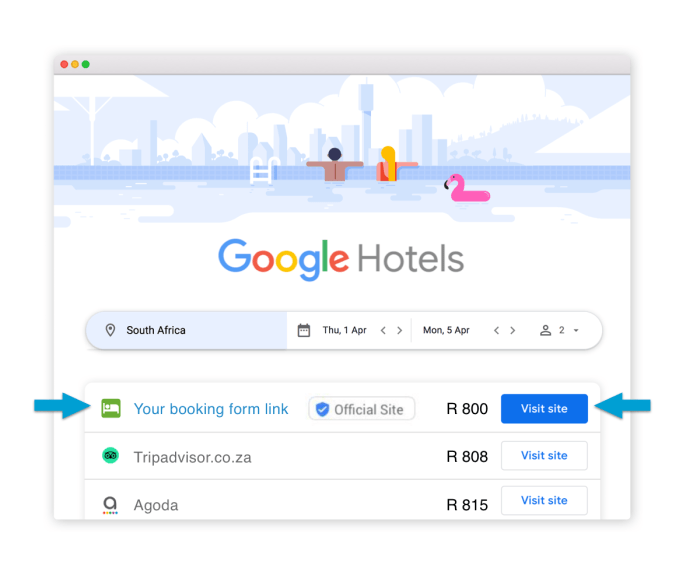Google Hotel Booking A Complete Guide

Google Hotel Booking has revolutionized how we plan trips. Instead of sifting through countless websites, you can now search, compare, and book hotels directly through Google Search. This guide will walk you through the entire process, from understanding user search behavior to exploring strategies for hotels to boost their visibility.
We’ll delve into how Google’s algorithm ranks hotels, the role of Google Hotel Ads, and the impact of features like Google Maps and Reviews on booking decisions. We’ll also examine different booking platforms integrated with Google, comparing their features and user experiences. Finally, we’ll look at future trends and the influence of emerging technologies like AI and VR on the hotel booking landscape.
User Search Behavior
Understanding how users search for hotels on Google is crucial for optimizing hotel listings and attracting more bookings. The search process is rarely linear, often involving multiple searches and iterations before a final decision is made.
Users typically begin their hotel search journey with a broad query, gradually refining their criteria until they find a suitable option. This iterative process involves various search types and considerations.
Types of Hotel Searches
Users employ diverse search strategies when looking for hotels. These searches can be categorized based on the level of specificity and the information sought. Common search types include location-based searches (e.g., “hotels near Times Square”), date-specific searches (e.g., “hotels in London 20th-22nd October”), and searches for specific hotel names (e.g., “The Ritz-Carlton New York”). Some searches combine these elements, for instance, “budget hotels near Disneyland Paris for families in July.” The complexity and specificity of the search reflect the user’s stage in the booking process and their level of decision-making.
Factors Influencing Hotel Choice
Numerous factors contribute to a user’s final hotel selection. Price is often a primary concern, especially for budget-conscious travelers. Location is another key factor, with proximity to attractions, transportation hubs, or specific neighborhoods influencing the decision. Online reviews significantly impact user perception, with positive reviews building trust and negative reviews raising concerns. Finally, amenities play a role, with features like free Wi-Fi, pools, or on-site restaurants adding value and influencing booking choices.
Factors Affecting Hotel Booking Decisions
| Factor | Importance | Influence on Booking Decision | Example |
|---|---|---|---|
| Price | High | Directly impacts affordability and budget constraints. Users often filter results based on price range. | A traveler on a tight budget might prioritize a hotel under $100 per night, while a luxury traveler might focus on options above $300. |
| Location | High | Determines convenience and accessibility to attractions, transportation, and desired neighborhoods. | A business traveler might prefer a hotel near their conference venue, while a tourist might prioritize proximity to major landmarks. |
| Reviews | High | Provides insights into guest experiences, influencing perceptions of cleanliness, service, and overall quality. | Positive reviews about a hotel’s cleanliness and friendly staff might sway a user towards booking, while negative reviews about noise levels could deter them. |
| Amenities | Medium | Adds value and enhances the overall stay experience. Specific amenities can be deal-breakers or incentives for booking. | The availability of a swimming pool, free breakfast, or airport shuttle might influence a user’s choice, especially for families or those seeking added convenience. |
Google Hotel Search Results Page (SERP) Analysis: Google Hotel Booking
Understanding the Google Hotel Search Results Page (SERP) is crucial for anyone involved in the hospitality industry. This section breaks down the key elements of the SERP and explains how Google’s algorithms influence what users see. This knowledge helps businesses optimize their online presence and improve their visibility to potential guests.
The Google Hotel SERP is a dynamic and complex landscape. Its purpose is to present users with the most relevant and useful hotel options based on their search query and other factors. Understanding its components is essential for effective hotel marketing strategies.
Key Components of a Google Hotel SERP
The Google Hotel SERP displays a variety of information designed to help users quickly find and compare hotels. These elements work together to provide a comprehensive overview of available options.
- Hotel Listings: These are the core of the SERP, displaying individual hotels with photos, prices, ratings, and key amenities.
- Price Comparison: Google often displays a price comparison chart, allowing users to easily see price differences across various hotels for their selected dates.
- Maps Integration: A map is frequently included, showing the location of each hotel relative to other points of interest and the user’s location.
- Filters and Sorting Options: Users can filter results by price, star rating, amenities, guest ratings, and other criteria. Sorting options might include price (low to high, high to low), rating, or popularity.
- Hotel Ads: Paid advertisements from hotels appear prominently within the results, often at the top or alongside organic listings. These ads are distinct from organic results.
- User Reviews and Ratings: Star ratings and user reviews play a significant role in influencing user decisions. These are prominently displayed for each hotel.
- Hotel Details Page Links: Each listing includes a link to a detailed page showing more information about the hotel, including photos, amenities, policies, and availability.
Google’s Hotel Ranking Algorithm
Google’s algorithm for ranking hotels within the SERP is proprietary and not publicly disclosed in full detail. However, several key factors are known to influence ranking. The algorithm aims to present the most relevant and useful hotels to each user based on their search criteria.
Factors influencing ranking include:
- Relevance to Search Query: Hotels closely matching the user’s search terms (location, dates, amenities) will rank higher.
- User Reviews and Ratings: High ratings and positive reviews significantly impact ranking. Consistent positive feedback signals quality to Google’s algorithm.
- Website Quality: A well-designed and user-friendly hotel website contributes to a better ranking. This includes factors like mobile-friendliness, ease of booking, and overall site performance.
- Booking Availability: Hotels with readily available rooms for the user’s selected dates are more likely to rank higher.
- Price Competitiveness: While not the sole factor, competitive pricing can positively influence ranking.
- Google Hotel Ads Bidding: Hotels participating in Google Hotel Ads can improve their visibility through strategic bidding and ad optimization.
The Role of Google Hotel Ads
Google Hotel Ads are paid advertisements that appear within the Google Hotel SERP. They offer hotels a way to increase their visibility and attract more bookings. These ads are marked as advertisements, differentiating them from organic listings.
Impact on User Experience:
- Increased Visibility: Hotel Ads allow hotels to stand out from organic results, potentially attracting more clicks and bookings.
- Targeted Reach: Advertisers can target specific demographics, locations, and dates to reach their ideal customers.
- Potential for Higher Conversion Rates: Users clicking on Hotel Ads are often further along in their booking journey, leading to potentially higher conversion rates compared to organic clicks.
- Competitive Landscape: The presence of Hotel Ads can create a more competitive SERP environment, impacting the organic ranking and visibility of hotels.
Hotel Booking Platforms Integrated with Google

Source: searchengineland.com
Google’s hotel search integrates with numerous online travel agencies (OTAs) and hotel booking platforms, offering users a broad selection of options when searching for accommodation. This integration provides a convenient one-stop shop for comparing prices and amenities across different providers. Understanding the features and strengths of each platform is key to finding the best deal and booking experience.
Several major players dominate the landscape of hotel booking platforms integrated with Google. These platforms vary significantly in their offerings, from basic price comparisons to sophisticated tools for managing bookings and loyalty programs. The following analysis will compare some of the most prominent platforms based on key features, Google integration, and overall user experience.
Comparison of Hotel Booking Platforms Integrated with Google
The table below offers a comparison of several key hotel booking platforms, focusing on their features, Google integration, and user experience. Remember that features and integrations can change, so it’s always advisable to check directly with the platform for the most up-to-date information.
| Platform | Key Features | Integration with Google | User Experience |
|---|---|---|---|
| Booking.com | Wide selection of hotels globally, detailed property information, guest reviews, flexible cancellation policies (often), various room types, price comparison tools, and loyalty programs. | Strong integration with Google Hotel Search; appears prominently in results, often with price and availability directly displayed. | Generally positive; known for its user-friendly interface and comprehensive search filters. However, some users find the sheer volume of options overwhelming. |
| Expedia | Similar to Booking.com in breadth of selection, offers packages (flights + hotels), car rentals, activities, and a loyalty program. | Strong integration; often appears high in Google Hotel Search results, with clear pricing and availability information. | User experience is generally positive but can be slightly less intuitive than Booking.com for some users due to the wider range of travel options offered. |
| Hotels.com | Focuses primarily on hotels, offers a rewards program (free night after 10 stays), price comparison tools, and detailed property information. | Good integration with Google Hotel Search, frequently appearing in results with competitive pricing. | Generally considered user-friendly and straightforward, with a clear focus on hotel bookings. The rewards program is a major draw for frequent travelers. |
| Kayak | Metasearch engine comparing prices from multiple OTAs and hotel websites, doesn’t directly book but redirects to the booking site. | Integrates well with Google Hotel Search, displaying prices from various sources in a single view. | User experience is strong for price comparison but requires additional steps to complete the booking on another platform. |
| Priceline | Offers “Express Deals” (opaque pricing) alongside standard hotel bookings, allowing for potentially significant discounts. Also offers packages and car rentals. | Integration with Google Hotel Search is present, but the opaque nature of Express Deals may not always be reflected in the search results. | User experience can be mixed; while Express Deals offers attractive prices, the lack of transparency about the hotel until booking can be a drawback for some. |
Booking through these platforms offers various advantages and disadvantages. For example, Booking.com often provides a wide selection and user-friendly interface, but the sheer volume of choices can be overwhelming. Expedia offers packages, but may not always be the cheapest option for individual hotel bookings. Hotels.com’s rewards program is attractive to frequent travelers, but its selection might be less extensive than some competitors. Kayak excels at price comparison but requires an extra step to complete the booking. Priceline’s Express Deals offer potentially significant savings, but lack transparency. Ultimately, the best platform depends on individual needs and preferences.
Impact of Google’s Features on Hotel Bookings
Google’s dominance in online search significantly influences how people find and book hotels. Its integrated features, from maps and reviews to price comparisons and visual elements, directly impact user decisions and booking rates. Understanding this influence is crucial for hotels and businesses operating within the online travel space.
Google Maps and Google Reviews’ Influence on Hotel Booking Decisions
Google Maps provides users with visual location information, highlighting proximity to attractions, transportation, and other points of interest. This visual aid is incredibly powerful; seeing a hotel’s location relative to a user’s planned activities can be a decisive factor in the booking process. For example, a traveler attending a conference might prioritize a hotel shown on Google Maps as being close to the conference center. Similarly, Google Reviews acts as a powerful social proof mechanism. Positive reviews, especially those including detailed descriptions and photos, significantly increase a hotel’s appeal and likelihood of being booked. Conversely, negative reviews, particularly those highlighting cleanliness or service issues, can deter potential guests. The sheer volume of reviews and the star rating prominently displayed on Google’s search results page make reviews a key element in user decision-making.
Google’s Price Comparison Tools’ Effect on User Choices
Google’s price comparison tools allow users to quickly compare hotel rates across various booking platforms. This transparency empowers users to find the best deals and encourages price-sensitive booking behavior. The ease of comparison eliminates the need for users to manually check multiple websites, leading to faster decision-making and potentially influencing them towards less expensive options, even if they’re slightly further from their desired location or have slightly lower ratings. The impact is evident in the shift towards price comparison sites and metasearch engines as the primary method for many travelers to discover and book hotels.
Impact of Google’s Visual Elements on User Engagement and Booking Rates
High-quality photos and virtual tours significantly improve user engagement and booking rates. A captivating photo gallery showcasing a hotel’s amenities, rooms, and surrounding areas can significantly increase its appeal. Virtual tours allow users to “experience” the hotel before booking, reducing uncertainty and building confidence in their choice. For example, a virtual tour showing a hotel’s pool and spa area might sway a traveler who initially considered a cheaper alternative without those amenities. The immersive experience offered by visual elements bridges the gap between online browsing and the actual hotel experience, encouraging more bookings and potentially justifying a higher price point for hotels that present themselves effectively.
Strategies for Hotels to Improve Google Hotel Booking Visibility

Source: shortpixel.ai
Getting your hotel noticed on Google Hotel Search is crucial for attracting online bookings. This involves a multi-faceted approach focusing on optimization, review management, and leveraging Google’s features. By implementing the strategies Artikeld below, hotels can significantly improve their visibility and attract more guests.
Optimizing Hotel Listings for Google Hotel Search
Effective optimization requires a thorough understanding of Google’s algorithm and user search behavior. This means ensuring your hotel’s information is accurate, consistent, and appealing to potential guests. Inconsistent information across various online platforms confuses Google and hurts your ranking.
- Accurate and Complete Information: Ensure your Google My Business profile is fully completed with accurate details including address, phone number, website, hours of operation, amenities, and high-quality photos. Pay close attention to the descriptions; use relevant s to improve searchability.
- High-Quality Images: Invest in professional photography showcasing your hotel’s best features – rooms, amenities, location, etc. Use a variety of images, including room types, common areas, and exterior shots.
- Optimization: Research relevant s related to your hotel’s location, amenities, and target audience. Incorporate these s naturally into your Google My Business profile description and website content. Avoid stuffing.
- Consistent Branding: Maintain consistent branding across all your online platforms, including your website, social media, and Google My Business profile. This reinforces your hotel’s identity and improves brand recognition.
Actionable Steps to Improve Google Hotel Search Ranking
Beyond optimizing your listing, several actions directly impact your ranking in Google Hotel Search results. These steps are designed to enhance your hotel’s visibility and attract more clicks.
- Claim and Optimize your Google My Business Profile: This is the foundation. Ensure your profile is verified and regularly updated with accurate and complete information.
- Integrate with Google Hotel Ads: Participating in Google Hotel Ads allows your hotel to appear prominently in Google Hotel Search results, increasing visibility and driving direct bookings.
- Monitor and Respond to Reviews: Actively engage with guest reviews on Google. Responding to both positive and negative reviews demonstrates responsiveness and professionalism, improving your overall rating and reputation.
- Build High-Quality Backlinks: While not directly influencing Google Hotel Search ranking, strong backlinks from reputable travel websites and blogs can indirectly improve your overall online presence and authority.
- Track Performance and Adjust Strategy: Regularly monitor your Google Hotel Search performance using Google Analytics and other tools. Analyze your results to identify areas for improvement and adjust your strategy accordingly.
Best Practices for Managing Online Reviews and Reputation on Google, Google hotel booking
Managing your online reputation is crucial for attracting bookings. Positive reviews build trust and encourage potential guests to choose your hotel.
Proactively solicit reviews from satisfied guests. Make it easy for them to leave reviews by providing clear instructions and links. Respond to all reviews, both positive and negative, in a timely and professional manner. Address negative reviews constructively, showing your commitment to guest satisfaction. Consider using review management software to help track and respond to reviews efficiently.
Future Trends in Google Hotel Booking

Source: thriftytraveler.com
Google’s role in hotel bookings is rapidly evolving, driven by technological advancements and changing user expectations. We can expect increasingly sophisticated features and a more seamless booking experience in the coming years. This section explores potential future developments and their impact on both hotels and travelers.
The convergence of artificial intelligence, virtual reality, and personalized data analysis will fundamentally reshape how people find and book hotels through Google. We’ll see a shift towards more proactive, predictive, and personalized services, moving beyond simple search and listings.
AI-Powered Personalization and Predictive Booking
AI will play a crucial role in personalizing the hotel booking experience. Imagine Google anticipating your travel needs based on your past searches, calendar events, and even your social media activity. This could lead to proactive suggestions for hotels tailored to your preferences, including personalized recommendations for specific rooms, amenities, and nearby attractions. The system might even predict the best time to book to secure the lowest price, alerting you to optimal booking windows. This level of personalization would significantly improve user satisfaction and potentially increase conversion rates for hotels that leverage these insights effectively.
Immersive Experiences with Virtual Reality (VR) and Augmented Reality (AR)
VR and AR technologies offer the potential to revolutionize how users experience hotels before booking. Imagine using VR to take a virtual tour of a hotel room, exploring its layout, amenities, and even the surrounding neighborhood. This immersive experience could significantly reduce the uncertainty associated with online bookings, leading to increased confidence and higher conversion rates. AR could also be integrated, allowing users to overlay information about nearby restaurants, attractions, and transportation options directly onto a live view of the hotel’s location. Hotels could leverage these technologies to showcase their unique selling points and create a more compelling booking experience.
Seamless Integration with Other Google Services
Expect even tighter integration between Google Hotel Search and other Google services. Imagine seamlessly booking a hotel directly from your Google Maps navigation, triggered by a search for nearby accommodations. Or perhaps integrating hotel bookings with Google Flights and Google Calendar for a fully coordinated travel itinerary. This increased interoperability will simplify the booking process for users and potentially drive increased traffic to hotels listed on Google.
| Trend | Potential Impact on Hotels | Impact on Users | Timeline |
|---|---|---|---|
| AI-Powered Personalization | Increased bookings from targeted advertising and improved conversion rates; need to optimize hotel profiles for AI-driven recommendations. | More relevant and personalized hotel suggestions; easier discovery of ideal hotels. | Short-term to Long-term |
| VR/AR Hotel Tours | Enhanced ability to showcase hotel features and amenities; potential for increased bookings due to reduced booking uncertainty. | Immersive hotel previews; reduced risk and increased confidence in online bookings. | Mid-term to Long-term |
| Seamless Integration with Google Services | Increased visibility and accessibility through integration with popular Google services; potential for higher booking volumes. | Simplified and more convenient hotel booking process; streamlined travel planning. | Short-term to Mid-term |
| Voice Search Optimization | Need to optimize hotel descriptions and information for voice search queries; focus on concise and conversational language. | Hands-free hotel search and booking; convenient for travelers on the go. | Short-term |
Final Summary

Source: nightsbridge.com
Mastering Google Hotel Booking requires understanding both the user journey and the intricacies of Google’s search algorithm. By optimizing your online presence, leveraging Google’s features effectively, and staying ahead of emerging trends, hotels can significantly improve their booking rates. For travelers, understanding how Google’s tools work allows for more efficient and informed hotel selection. This guide provides a solid foundation for both sides of the equation, empowering both hotels and travelers to navigate the ever-evolving world of online hotel booking.
Expert Answers
Can I cancel a hotel booking made through Google?
Cancellation policies vary depending on the hotel and the booking platform used. Check your booking confirmation for details on cancellation fees and deadlines.
How does Google protect my payment information?
Google uses secure payment processing systems to protect your financial information. However, always review the security measures of the individual booking platform before entering your details.
Does Google offer price guarantees on hotel bookings?
Google doesn’t directly offer price guarantees. However, some booking platforms integrated with Google might offer their price match guarantees. Check the terms and conditions of the platform you’re using.
Are all hotels listed on Google Hotel Search?
No, only hotels that have partnered with Google or are listed on integrated booking platforms will appear in Google Hotel Search results.
How can I filter my Google Hotel Search results?
Google Hotel Search offers various filters, including price range, star rating, amenities, guest reviews, and more. Use these filters to refine your search and find the perfect hotel for your needs.
Comments are closed.